Are you torn between a hard or soft tonneau cover for your truck?
This age-old debate has puzzled many truck owners looking to protect their cargo and enhance their vehicle’s appearance.
Both options offer unique advantages, but which one truly fits your lifestyle?
From durability and security to cost and ease of use, I’ll dive into the key differences between hard and soft tonneau covers.
By the end of this guide, you’ll have all the information you need to make the perfect choice for your beloved pickup. Let’s uncover which cover has you covered!
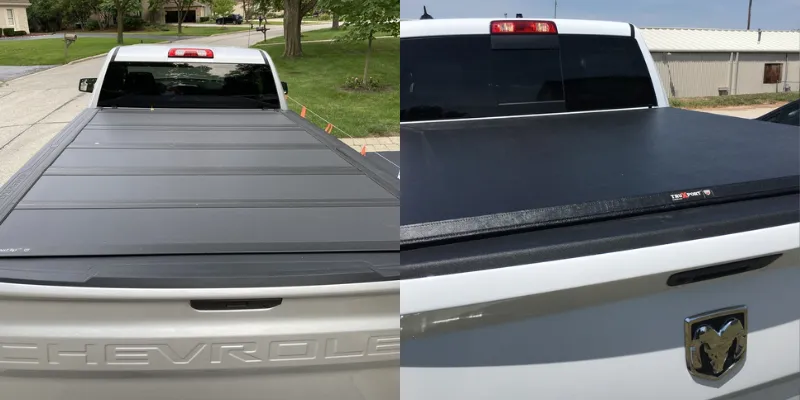
What Is The Main Difference Between A Hard And Soft Tonneau Cover?
The main difference between hard and soft tonneau covers is their construction material. Hard covers are made from rigid materials like aluminum, fiberglass, or plastic, offering superior security and durability. Soft covers use vinyl or fabric materials, providing affordability and easier installation while sacrificing some protection.
Our top recommendation for a hard tonneau cover is the RealTruck BAKFlip MX4 Hard Folding Tonneau Cover. For a soft option, we highly recommend the RealTruck Extang Trifecta 2.0 Soft Folding Tonneau Cover.
Quick Comparison
| Feature | Hard Tonneau Cover | Soft Tonneau Cover |
|---|---|---|
| Material | Fiberglass, aluminum, or hard plastic | Vinyl, canvas, or polyester |
| Security | High – More difficult to cut or break into | Moderate – Can be cut with a sharp object |
| Weather Protection | Excellent – Fully sealed against water and debris | Good – Water-resistant but may leak in heavy rain |
| Durability | High – Resistant to wear and tear | Moderate – May need replacement after a few years |
| Weight | Heavy – 50-100 lbs depending on size and material | Light – Usually under 30 lbs |
| Installation | More complex – May require professional installation | Simpler – Often DIY-friendly |
| Ease of Use | Varies – Some models fold, others lift as one piece | Easy – Roll up or fold for quick access |
| Cargo Height Limitation | Yes – Limited to the height of the cover | No – Can accommodate taller items when open |
| Aesthetics | Sleek, integrated look | More casual, traditional look |
| Price Range | Higher – Generally $500-$2000+ | Lower – Generally $200-$600 |
| Fuel Efficiency Impact | Better – More aerodynamic, can improve MPG | Good – Improves aerodynamics over an open bed |
| Customization Options | Limited – Usually come in pre-set designs | More options – Various colors and styles available |
| Maintenance | Low – Occasional cleaning and lubrication | Moderate – Regular cleaning and possible re-tensioning |
| Compatibility with Bed Liners | May require modifications | Generally compatible without modifications |
| Typical Warranty | Longer – Often 3-5 years or lifetime limited | Shorter – Usually 1-3 years |
| Impact on Truck Resale Value | May increase resale value | Minimal impact on resale value |
| Noise While Driving | Quieter – Less wind noise at high speeds | May create some flapping noise at high speeds |
| Storage When Not in Use | Difficult – Requires large storage space if removed | Easy – Can be rolled up and stored in small spaces |
| Load-Bearing Capacity | High – Some models can support several hundred pounds | Low – Not designed to support significant weight |
| Winter Performance | Excellent – No issues with snow accumulation | May sag under heavy snow; more difficult to use in freezing temperatures |
Let’s go into more detail.
Our top recommendation for a hard tonneau cover is the RealTruck BAKFlip MX4 Hard Folding Tonneau Cover. For a soft option, we highly recommend the RealTruck Extang Trifecta 2.0 Soft Folding Tonneau Cover.
Material
Hard tonneau covers are typically made of fiberglass, aluminum, or hard plastic. These materials give them a solid, durable structure.
Fiberglass covers are lightweight and can be painted to match your truck. Aluminum covers are super strong and resist dents.
Hard plastic covers are the most affordable option in this category. They’re tough but might not last as long as metal ones.
Soft tonneau covers usually use vinyl, canvas, or polyester. These materials are flexible and lightweight.
Vinyl is the most common. It’s waterproof and easy to clean. Canvas is durable and has a classic look.
Polyester is lightweight and resists fading. It’s a good choice for sunny climates.
Security
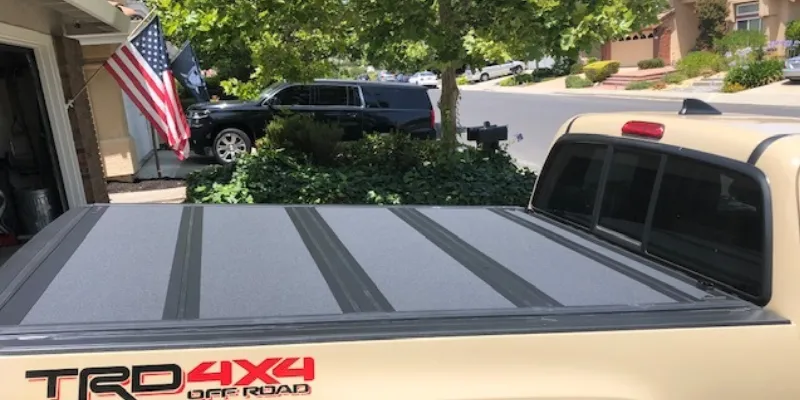
Hard tonneau covers offer top-notch security for your truck bed. They’re like a vault for your stuff.
Most hard covers have locks that work with your truck’s tailgate lock. This creates a super secure cargo area.
Thieves can’t easily cut through or break into a hard cover. It’s a great choice if you often leave valuable items in your truck.
Soft tonneau covers provide moderate security. They’re better than leaving your truck bed open, but not as secure as hard covers.
A determined thief could cut through a soft cover with a sharp knife. However, the cover still hides your cargo from view.
Some soft covers have locks, but they’re not as strong as hard cover locks. They’re more of a deterrent than a foolproof solution.
Weather Protection
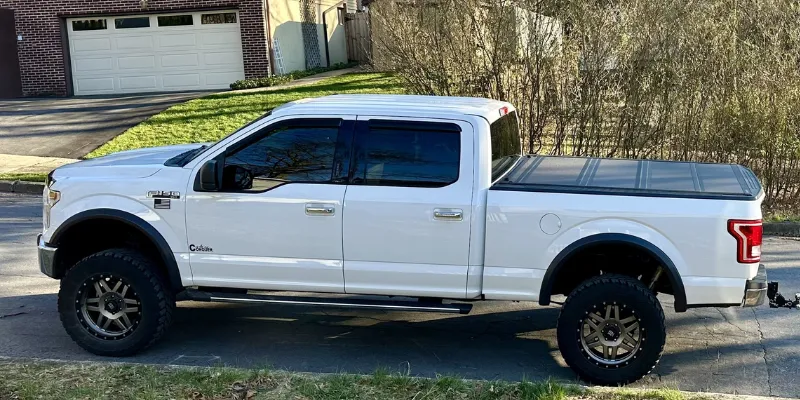
Hard tonneau covers excel at keeping the elements out of your truck bed. They create a watertight seal when closed.
Rain, snow, and debris won’t get into your truck bed with a good hard cover. This keeps your cargo dry and clean.
Hard covers can handle heavy snow loads without sagging. They’re great for all weather conditions.
Soft tonneau covers offer good, but not perfect, weather protection. Most are water-resistant, not fully waterproof.
Light rain usually isn’t a problem for soft covers. But in heavy downpours, some water might seep through the edges.
Soft covers can collect snow and water, which you’ll need to remove. They’re better suited for milder climates.
Durability
Hard tonneau covers are built to last. They can take a beating and keep on protecting.
UV rays, extreme temperatures, and daily wear and tear don’t faze hard covers much. They often last as long as the truck itself.
Hard covers resist scratches and dents. You don’t have to baby them to keep them looking good.
Soft tonneau covers are less durable but still tough. They might need replacement after a few years of heavy use.
The fabric can fade or wear out over time, especially in harsh sunlight. Some may develop small tears or holes.
However, soft covers are easy to repair. Small issues can often be fixed with a patch kit.
Weight
Hard tonneau covers are heavy. They can weigh anywhere from 50 to 100 pounds or more.
The weight depends on the size of your truck bed and the cover material. Aluminum covers are usually lighter than fiberglass.
Installing a hard cover might require two people. The weight can make them tricky to remove when needed.
Soft tonneau covers are much lighter. Most weigh less than 30 pounds.
This light weight makes them easy to install or remove by yourself. You can take them off quickly if you need to haul large items.
The downside is that soft covers might flap in the wind at high speeds due to their lightweight nature.
Installation
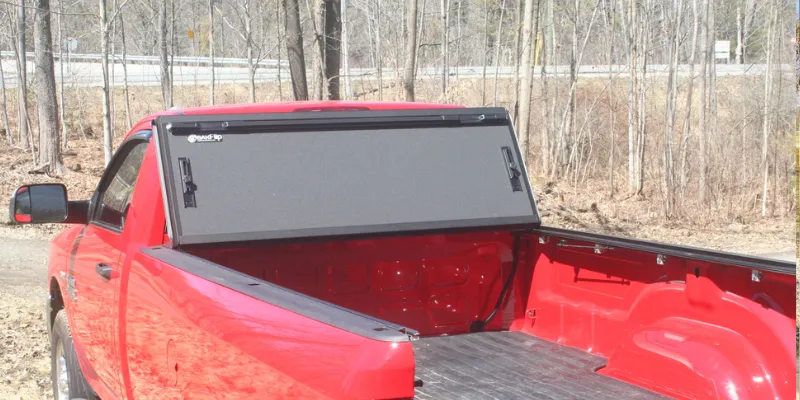
Hard tonneau cover installation can be complex. You might need special tools or professional help.
Most hard covers clamp onto your truck bed rails. Some require drilling holes in your truck for a secure fit.
Installation usually takes a couple of hours. It’s not a quick, do-it-yourself job for most people.
Soft tonneau covers are usually easier to install. Many are designed for DIY installation.
Most soft covers use a simple clamp system. You can often install them in under an hour with basic tools.
Some soft covers snap into place or use Velcro. These are super easy to put on or take off as needed.
Ease of Use
Hard tonneau cover ease of use varies by design. Some are more convenient than others.
Folding hard covers are easy to open partially for quick access. But they can be heavy to lift.
One-piece hard covers that tilt up can be tricky to open in tight spaces. They might need gas struts for support.
Soft tonneau covers are generally very easy to use. They’re designed for quick access to your truck bed.
Roll-up soft covers are the easiest. You can quickly roll them up to access your entire truck bed.
Folding soft covers are also simple to use. They fold in sections for partial or full bed access.
Cargo Height Limitation
Hard tonneau covers limit how high you can stack cargo in your truck bed. They have a fixed height.
You can’t close a hard cover if your cargo is taller than the bed rails. This can be inconvenient for big loads.
Some hard covers can support weight on top, which can make up for the height limitation.
Soft tonneau covers are more flexible with cargo height. They don’t have a strict height limit.
You can often close a soft cover over taller items by leaving it a bit loose. This isn’t completely secure, but it works in a pinch.
When fully open, soft covers don’t limit your cargo height at all. You can haul tall items easily.
Aesthetics
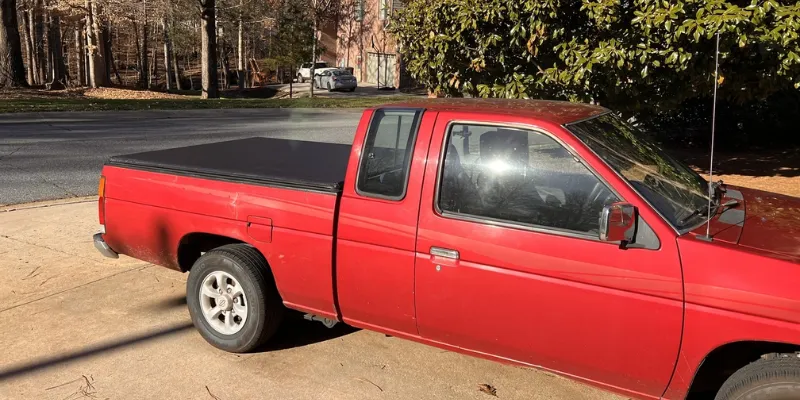
Hard tonneau covers give your truck a sleek, integrated look. They often appear as a natural extension of the vehicle.
Many hard covers can be painted to match your truck’s color perfectly. This creates a seamless appearance.
The smooth, solid surface of a hard cover can make your truck look more premium and well-equipped.
Soft tonneau covers have a more casual, traditional look. They maintain the classic pickup truck style.
Soft covers often have a slightly wrinkled or textured appearance. This can give your truck a rugged, ready-for-action vibe.
You can choose from various colors and textures with soft covers to customize your truck’s look.
Price Range
Hard tonneau covers are more expensive. They usually cost between $500 and $2000, sometimes even more.
The high price reflects their durability, security features, and complex construction. Aluminum covers tend to be pricier than fiberglass or plastic.
Despite the high upfront cost, many truck owners find hard covers to be a good long-term investment.
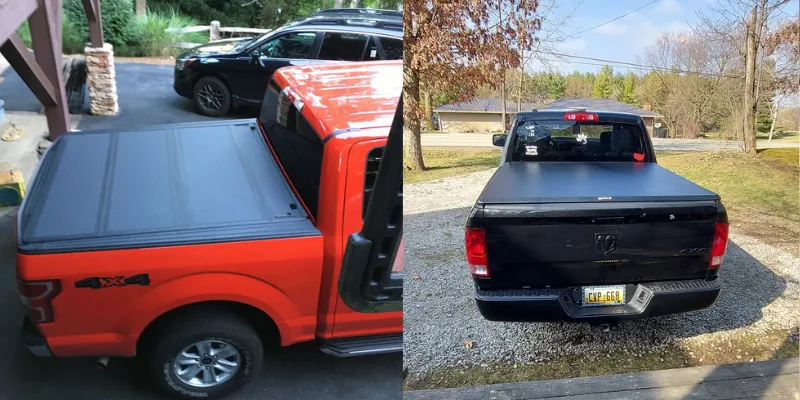
Soft tonneau covers are more budget-friendly. Most fall in the $200 to $600 range.
The lower price makes soft covers a popular choice for truck owners who want basic cargo protection without breaking the bank.
Even high-end soft covers with extra features are usually cheaper than basic hard covers.
Fuel Efficiency Impact
Hard tonneau covers can noticeably improve your truck’s fuel efficiency. They create a smooth surface over the truck bed.
This smooth surface reduces air drag, especially at highway speeds. Less drag means better gas mileage.
Some truck owners report fuel savings of 5-10% with a hard tonneau cover. That can add up over time!
Soft tonneau covers also improve fuel efficiency, but usually not as much as hard covers.
They still reduce air drag compared to an open truck bed. This leads to some fuel savings.
However, soft covers can sometimes billow or flap at high speeds, which might reduce their aerodynamic benefit.
Customization Options
Hard tonneau covers have limited customization options. They usually come in pre-set designs.
You can often choose between a glossy or matte finish. Some can be painted to match your truck’s color exactly.
Beyond color, there aren’t many ways to personalize a hard cover. What you see is mostly what you get.
Soft tonneau covers offer more customization choices. You have lots of options to make your truck unique.
You can choose from various colors, textures, and patterns. Some even allow for custom printing or graphics.
It’s easier to find soft covers with unique features like special folding patterns or integrated cargo management systems.
Maintenance
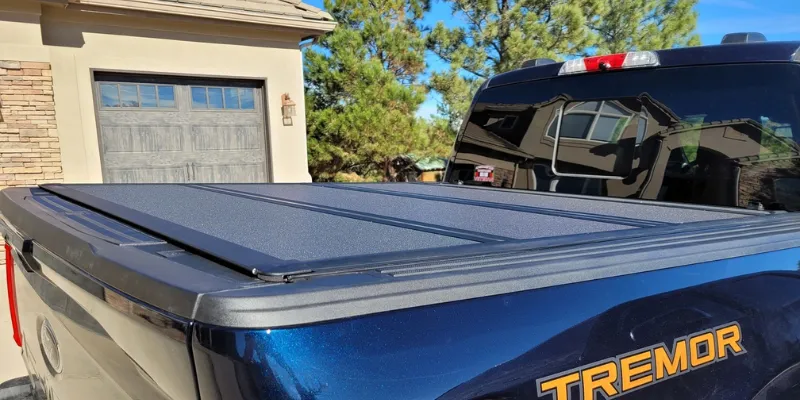
Hard tonneau covers need very little maintenance. They’re built to be low-fuss.
Occasional cleaning with soap and water is usually all they need. This keeps them looking good and working well.
Some hard covers might need lubricant on their hinges or locks once in a while. But that’s about it for regular care.
Soft tonneau covers require a bit more maintenance. They need regular attention to stay in good shape.
Cleaning is important to prevent mold and mildew, especially in damp climates. Use specialized cleaners to protect the fabric.
You might need to re-tension the cover periodically. This keeps it tight and prevents sagging or flapping.
Compatibility with Bed Liners
Hard tonneau covers might need modifications to work with some bed liners. It depends on the specific cover and liner.
Some hard covers don’t play nice with over-the-rail bed liners. You might need to trim the liner or choose a different cover.
Under-the-rail bed liners usually work fine with hard covers. But always check compatibility before buying.
Soft tonneau covers are generally more compatible with bed liners. They’re more forgiving in terms of fit.
Most soft covers work well with both over-the-rail and under-the-rail bed liners without modifications.
The flexible nature of soft covers makes it easier to get a good seal, even with a bed liner installed.
Typical Warranty
Hard tonneau covers often come with longer warranties. This reflects their durability and higher price point.
Many hard cover warranties last 3-5 years. Some even offer lifetime limited warranties.
These long warranties can give you peace of mind about your investment in a hard cover.
Soft tonneau covers typically have shorter warranty periods. They’re not expected to last as long as hard covers.
Most soft cover warranties range from 1-3 years. This is still enough to cover any manufacturing defects.
Some high-end soft covers might offer longer warranties, but it’s less common than with hard covers.
Impact on Truck Resale Value
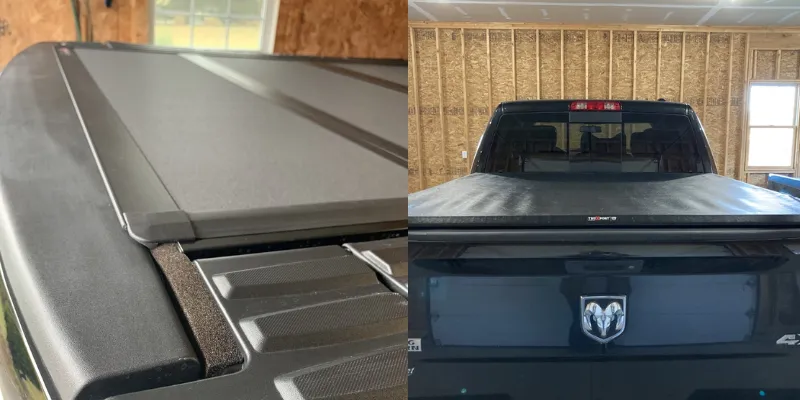
Hard tonneau covers can potentially increase your truck’s resale value. They’re seen as a premium accessory.
A well-maintained hard cover shows that you’ve taken good care of your truck. This can impress potential buyers.
The added security and weather protection of a hard cover can be a selling point when you’re ready to upgrade your truck.
Soft tonneau covers have minimal impact on resale value. They’re not seen as a significant upgrade.
While a soft cover is better than no cover, it probably won’t boost your truck’s price much when selling.
However, having any cover shows that you’ve made an effort to protect the truck bed, which can be a positive.
Noise While Driving
Hard tonneau covers are generally very quiet while driving. They don’t create much wind noise.
The solid construction prevents rattling or flapping sounds at high speeds. This makes for a peaceful ride.
Some poorly fitted hard covers might create a whistling sound. But this is rare and usually easy to fix.
Soft tonneau covers can be noisier, especially at highway speeds. The fabric might flap in the wind.
Good quality soft covers with tight tensioning systems are quieter. But they’ll never be as silent as hard covers.
In windy conditions, you might hear some noise from a soft cover. It’s usually not too bothersome, though.
Storage When Not in Use
Hard tonneau covers are tricky to store when not on your truck. They’re big and bulky.
If you need to remove a one-piece hard cover, you’ll need a lot of storage space. They don’t fold up small.
Folding hard covers are a bit easier to store. But they’re still much bulkier than soft covers.
Soft tonneau covers are super easy to store when not in use. They take up very little space.
Roll-up soft covers can be, well, rolled up into a compact cylinder. They’ll fit in a garage corner or closet.
Folding soft covers also compact down pretty small. You can easily stow them away when you need your full truck bed.
Load-Bearing Capacity
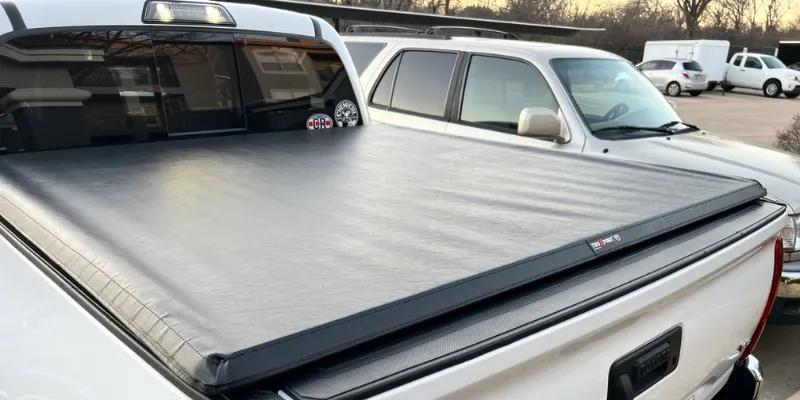
Hard tonneau covers often have impressive load-bearing capacity. Some can support several hundred pounds.
This means you can use the cover as an extra surface for hauling cargo. It’s like adding another level to your truck bed.
Check the manufacturer’s specs for exact weight limits. Don’t exceed them, or you could damage the cover or your truck.
Soft tonneau covers are not designed to bear significant weight. They’re for covering, not carrying.
Putting heavy items on a soft cover could damage it or cause it to sag. It’s best to avoid this altogether.
Some soft covers might support very light items, like leaves or snow. But they’re not meant for real cargo.
Winter Performance
Hard tonneau covers excel in winter conditions. They’re built to handle tough weather.
Snow and ice slide right off the slick surface of a hard cover. This keeps your truck bed clear and accessible.
The rigid structure prevents snow accumulation, which could otherwise lead to cover damage or collapse.
Soft tonneau covers can struggle in harsh winter weather. They’re not as well-suited for snowy climates.
Snow can accumulate on soft covers, potentially causing them to sag or even tear under the weight.
Using a soft cover in freezing temperatures can be challenging. The material might become stiff and hard to roll or fold.
Final Thoughts
Choosing between a hard and soft tonneau cover ultimately comes down to your specific needs and priorities.
Hard covers excel in security and durability, making them ideal for those who need maximum protection.
Soft covers offer flexibility and affordability, perfect for drivers who frequently access their truck bed.
Both types can enhance your vehicle’s appearance and fuel efficiency. Consider your budget, usage patterns, and desired features when making your decision.
Remember, the best tonneau cover is the one that seamlessly integrates with your lifestyle and keeps your cargo safe.
Whichever you choose, you’re investing in both style and functionality for your trusty truck.
Our top recommendation for a hard tonneau cover is the RealTruck BAKFlip MX4 Hard Folding Tonneau Cover. For a soft option, we highly recommend the RealTruck Extang Trifecta 2.0 Soft Folding Tonneau Cover.
